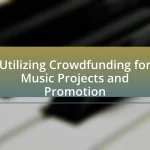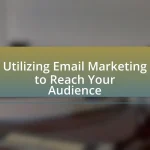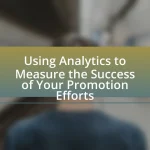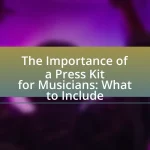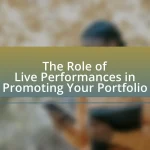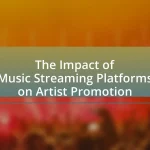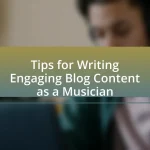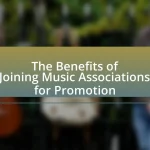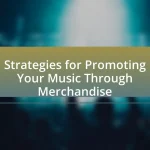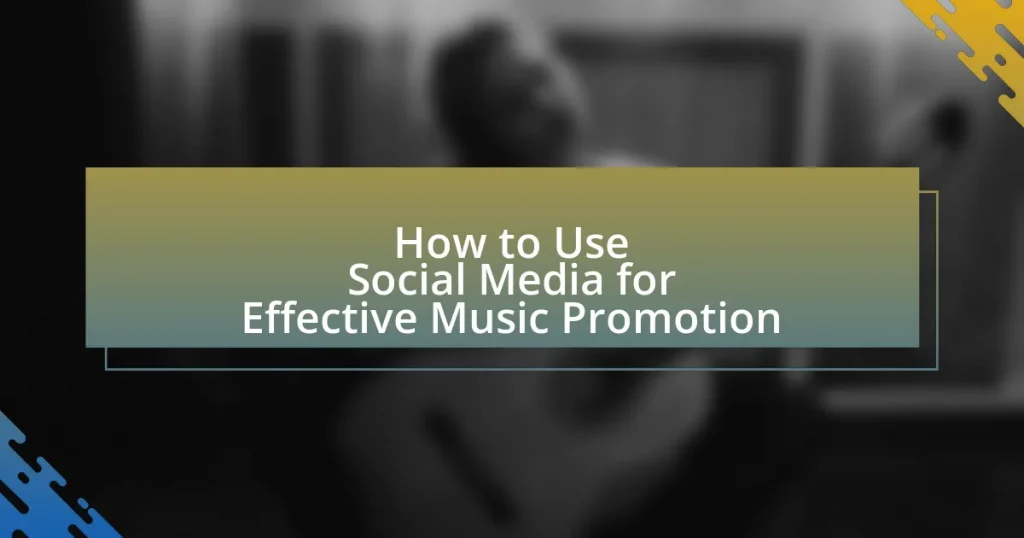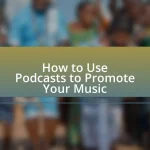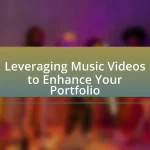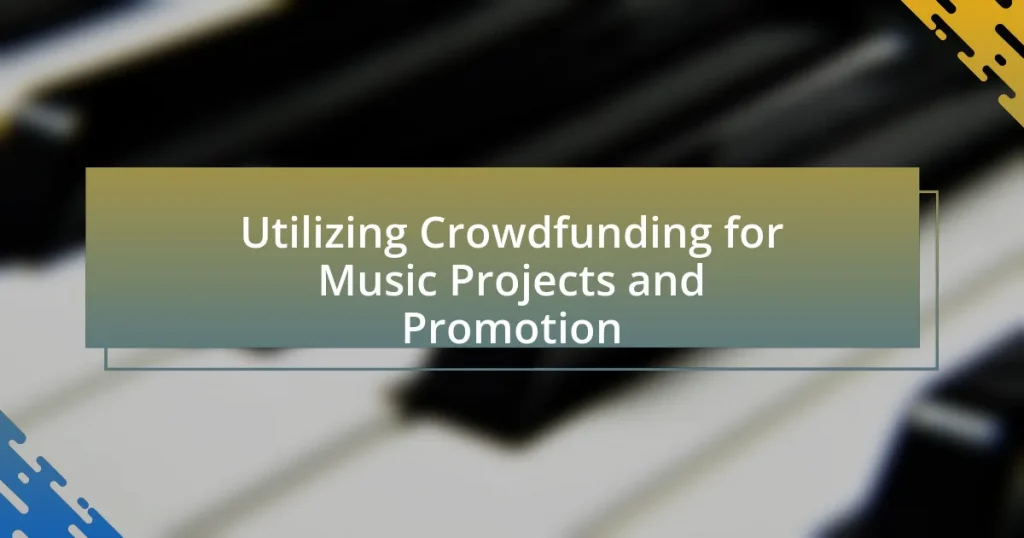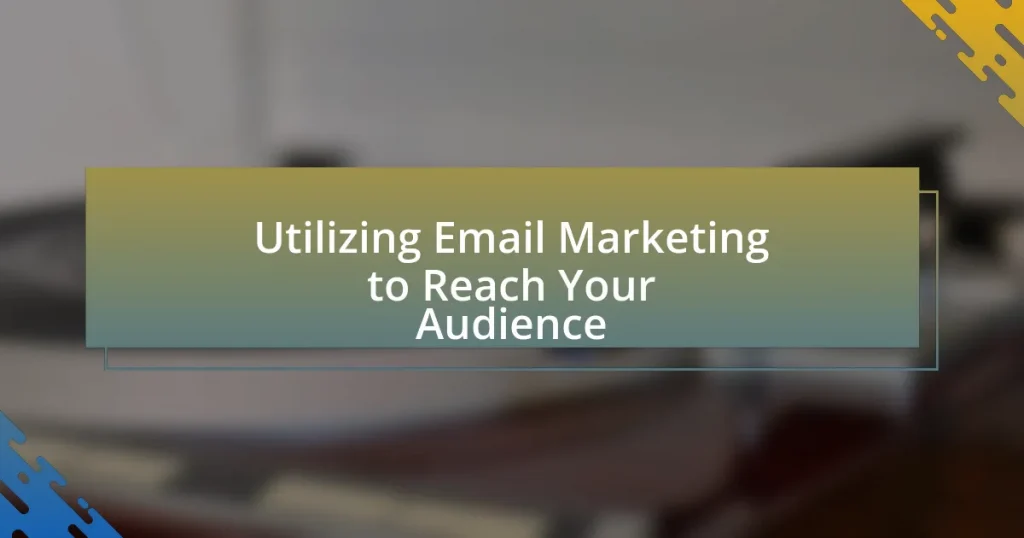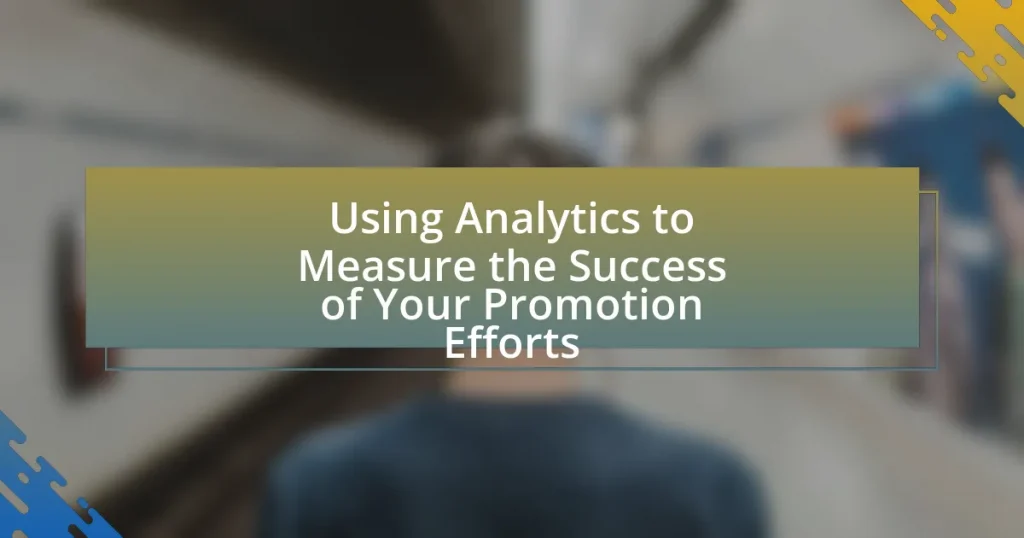Social media music promotion refers to the strategic use of platforms such as Facebook, Instagram, Twitter, and TikTok to market music and artists, significantly influencing audience engagement and music discovery. Key platforms for promotion include Facebook for event promotion, Instagram for visual storytelling, TikTok for viral trends, and YouTube for music videos. The article outlines the importance of defining target audiences, creating engaging content, and measuring success through performance metrics. It also highlights best practices for fan engagement, common pitfalls to avoid, and practical tips to enhance promotional efforts, emphasizing the critical role of authenticity and storytelling in building a loyal fanbase.
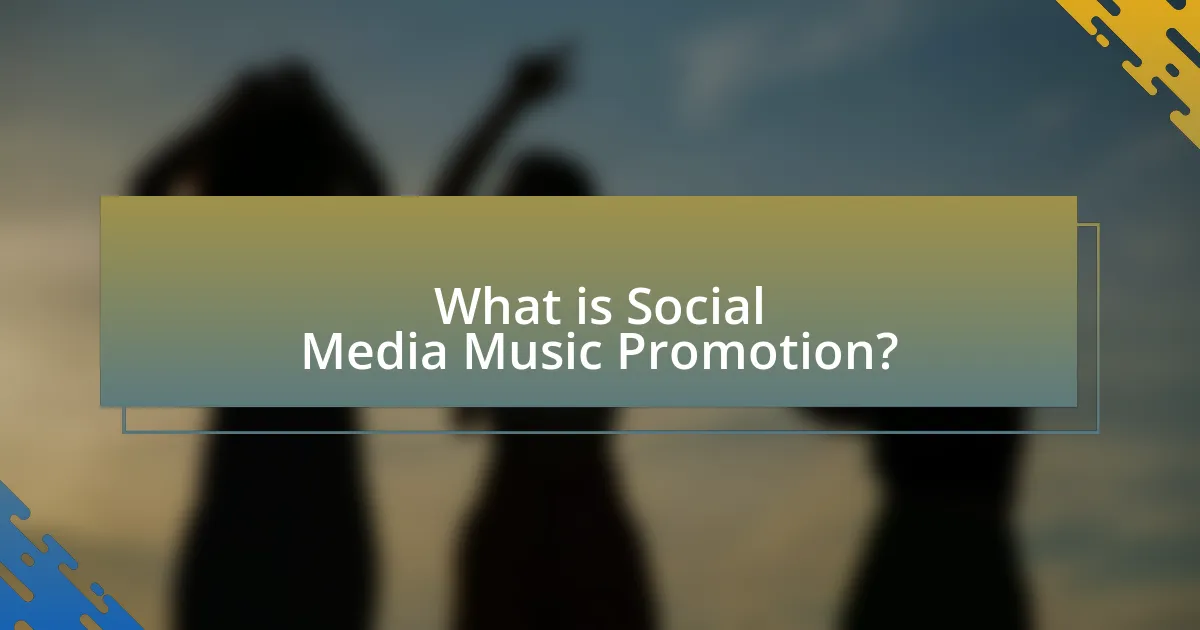
What is Social Media Music Promotion?
Social media music promotion is the use of social media platforms to market and promote music and artists. This strategy leverages platforms like Facebook, Instagram, Twitter, and TikTok to reach a wider audience, engage fans, and drive music sales or streaming. According to a 2021 report by the International Federation of the Phonographic Industry, 75% of music listeners discover new music through social media, highlighting its effectiveness in reaching potential fans.
How does social media influence music promotion?
Social media significantly influences music promotion by providing artists with direct access to their audience, enabling real-time engagement and content sharing. Platforms like Instagram, TikTok, and Twitter allow musicians to showcase their work, connect with fans, and create viral marketing campaigns. For instance, TikTok has been instrumental in launching songs to mainstream success, with tracks like “Old Town Road” by Lil Nas X gaining popularity through user-generated content and challenges. This direct interaction fosters a sense of community and loyalty among fans, which traditional promotion methods often lack. Additionally, social media analytics provide artists with valuable insights into audience preferences, helping them tailor their promotional strategies effectively.
What are the key platforms for music promotion on social media?
The key platforms for music promotion on social media are Facebook, Instagram, Twitter, TikTok, and YouTube. Facebook allows artists to create pages, engage with fans, and promote events, with over 2.8 billion monthly active users providing a vast audience. Instagram’s visual focus and features like Stories and Reels enable artists to showcase their music creatively, reaching over 1 billion users. Twitter facilitates real-time engagement and updates, making it ideal for connecting with fans and industry professionals. TikTok’s short-form video format has become a powerful tool for viral music promotion, with many songs gaining popularity through user-generated content. YouTube serves as a primary platform for music videos and live performances, with over 2 billion logged-in monthly users, making it essential for artists to reach a global audience.
How do different demographics engage with music on social media?
Different demographics engage with music on social media through varied platforms and content types, reflecting their unique preferences and behaviors. For instance, younger audiences, particularly those aged 18-24, predominantly use platforms like TikTok and Instagram to discover and share music, often participating in trends and challenges that promote songs virally. In contrast, older demographics, such as those aged 35 and above, tend to favor Facebook and YouTube, where they engage with longer-form content, including music videos and live performances.
Research by the Pew Research Center indicates that 90% of adults aged 18-29 use social media, with 67% of them using it to follow artists and music trends, while only 40% of adults aged 50 and older engage similarly. This data highlights the generational differences in music engagement on social media, with younger users more likely to interact with music through user-generated content and older users preferring established media formats.
Why is social media important for musicians?
Social media is important for musicians because it provides a platform for direct engagement with fans and promotes their music effectively. By utilizing social media, musicians can share their work, connect with audiences, and build a loyal fanbase. According to a 2021 survey by the International Federation of the Phonographic Industry, 80% of music consumers discover new music through social media platforms. This statistic underscores the critical role social media plays in music promotion and audience outreach.
What advantages does social media offer over traditional promotion methods?
Social media offers greater reach and engagement compared to traditional promotion methods. Unlike traditional methods, which often rely on static advertisements in print or broadcast media, social media platforms enable real-time interaction and feedback from audiences. For instance, a study by Pew Research Center in 2021 indicated that 72% of the public uses some form of social media, allowing artists to connect directly with millions of potential fans. Additionally, social media allows for targeted advertising, enabling promotions to be tailored to specific demographics, which is less feasible in traditional media. This targeted approach can lead to higher conversion rates, as evidenced by a report from Hootsuite, which found that social media ads can generate up to 24% more engagement than traditional ads.
How can social media help in building a fanbase?
Social media helps in building a fanbase by providing platforms for direct engagement and interaction with audiences. Artists can share content, such as music, videos, and personal updates, which fosters a sense of community and connection. According to a 2021 survey by the International Federation of the Phonographic Industry, 70% of music fans discover new artists through social media platforms, highlighting their effectiveness in reaching potential fans. Additionally, social media allows for targeted advertising, enabling artists to reach specific demographics that align with their music style, further enhancing fanbase growth.
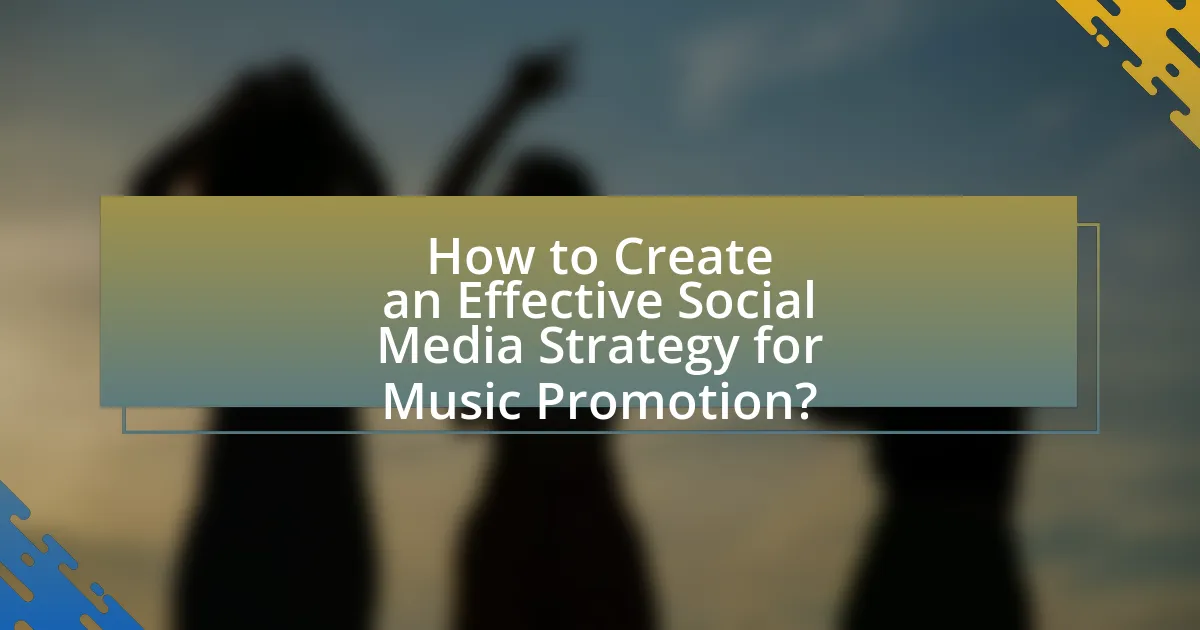
How to Create an Effective Social Media Strategy for Music Promotion?
To create an effective social media strategy for music promotion, artists should focus on defining their target audience, selecting appropriate platforms, and creating engaging content. Identifying the target audience allows artists to tailor their messaging and content to resonate with specific demographics, which is crucial for engagement. Choosing platforms like Instagram, TikTok, and Twitter, which have high user engagement rates among music fans, ensures that promotional efforts reach the right people. Engaging content, such as behind-the-scenes videos, live performances, and interactive posts, fosters a connection with fans and encourages sharing, which can amplify reach. According to a 2021 report by Hootsuite, 54% of social media users use these platforms to discover new music, highlighting the importance of a strategic approach in leveraging social media for music promotion.
What are the essential steps in developing a social media strategy?
The essential steps in developing a social media strategy include defining goals, identifying target audiences, selecting appropriate platforms, creating engaging content, scheduling posts, and analyzing performance. Defining goals ensures clarity on what the strategy aims to achieve, such as increasing brand awareness or driving sales. Identifying target audiences allows for tailored messaging that resonates with specific demographics. Selecting appropriate platforms is crucial, as different platforms cater to different audiences; for instance, Instagram is visual-centric, while Twitter is more text-focused. Creating engaging content involves producing high-quality visuals, videos, and posts that capture attention and encourage interaction. Scheduling posts at optimal times maximizes reach and engagement. Finally, analyzing performance through metrics like engagement rates and follower growth provides insights into what works and what needs adjustment, ensuring continuous improvement of the strategy.
How do you define your target audience on social media?
To define your target audience on social media, analyze demographic data, interests, and behaviors relevant to your music genre. This involves utilizing analytics tools provided by platforms like Facebook and Instagram, which offer insights into age, gender, location, and engagement patterns of your followers. For instance, a study by Pew Research Center indicates that 69% of adults use Facebook, making it a key platform for reaching diverse age groups. By segmenting your audience based on these factors, you can tailor your content and promotional strategies to resonate with specific groups, enhancing engagement and effectiveness in music promotion.
What content types should you focus on for music promotion?
For music promotion, focus on video content, audio snippets, and engaging visuals. Video content, such as music videos and behind-the-scenes footage, captures attention and increases shareability, as platforms like YouTube and TikTok prioritize video engagement. Audio snippets, particularly short clips of songs, can be effectively shared on platforms like Instagram and Twitter, allowing listeners to sample music quickly. Engaging visuals, including album artwork and promotional graphics, enhance brand identity and attract followers on social media. These content types are supported by statistics indicating that video posts generate 1200% more shares than text and image posts combined, making them essential for effective music promotion.
How can you measure the success of your social media efforts?
To measure the success of social media efforts, track key performance indicators (KPIs) such as engagement rates, follower growth, and conversion rates. Engagement rates, which include likes, shares, and comments, indicate how well content resonates with the audience; for instance, a 2% engagement rate is considered average across platforms. Follower growth reflects the expanding reach of social media efforts, with a consistent increase suggesting effective strategies. Conversion rates, which measure the percentage of users taking desired actions (like signing up for a newsletter or purchasing music), provide direct insight into the effectiveness of promotional campaigns. According to a report by Hootsuite, brands that actively monitor these metrics can improve their social media ROI by up to 30%.
What metrics should you track for effective music promotion?
To effectively promote music, track metrics such as engagement rate, reach, follower growth, and conversion rate. Engagement rate measures interactions (likes, shares, comments) relative to total followers, indicating how well content resonates with the audience. Reach quantifies the total number of unique users who see posts, helping assess visibility. Follower growth tracks the increase in audience size over time, reflecting the effectiveness of promotional strategies. Conversion rate measures the percentage of users who take a desired action, such as streaming a song or purchasing merchandise, providing insight into the success of promotional efforts. These metrics collectively inform strategies and optimize music promotion on social media platforms.
How can you adjust your strategy based on performance data?
To adjust your strategy based on performance data, analyze key metrics such as engagement rates, reach, and conversion rates from your social media campaigns. By identifying which posts or campaigns yield the highest engagement, you can refine your content to focus on similar themes or formats that resonate with your audience. For instance, if video content generates 60% more engagement than static posts, prioritize video production in your strategy. Additionally, using tools like Google Analytics or social media insights can provide concrete data on audience demographics and behavior, allowing for targeted adjustments that enhance overall effectiveness in music promotion.
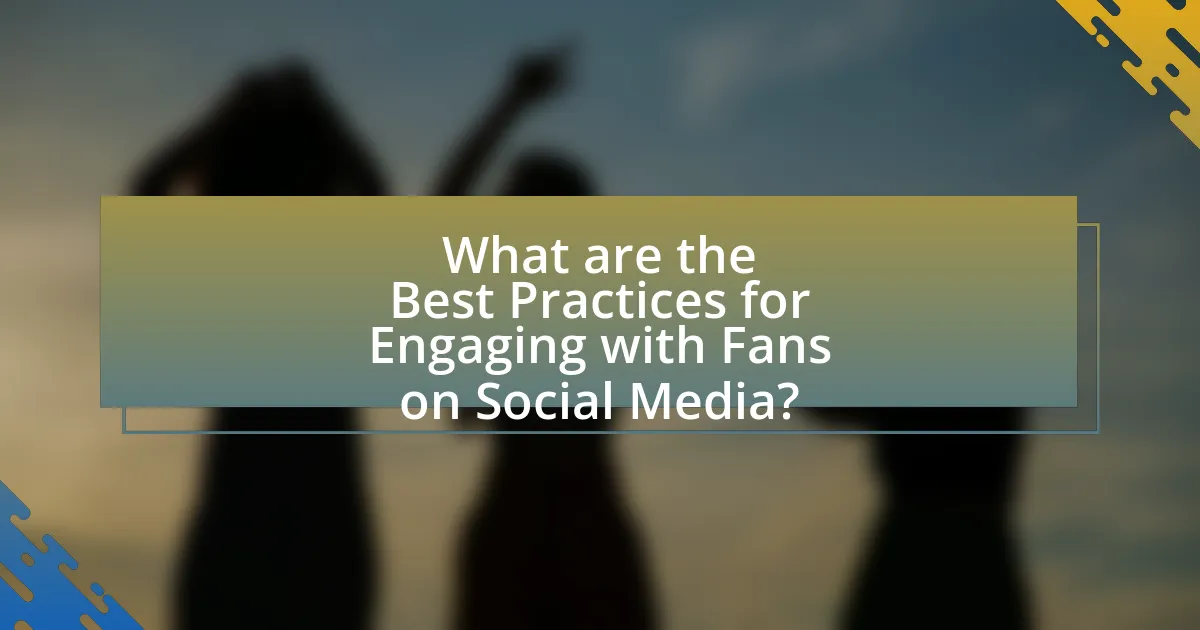
What are the Best Practices for Engaging with Fans on Social Media?
The best practices for engaging with fans on social media include responding promptly to comments, creating interactive content, and maintaining a consistent posting schedule. Engaging with fans through timely responses fosters a sense of community and loyalty, as studies show that 70% of consumers feel more connected to brands that respond to their inquiries. Interactive content, such as polls and Q&A sessions, encourages participation and enhances fan involvement, leading to increased engagement rates. Additionally, a consistent posting schedule keeps the audience informed and engaged, with research indicating that brands that post regularly see a 50% increase in audience interaction.
How can you effectively interact with your audience?
To effectively interact with your audience, engage them through consistent and authentic communication on social media platforms. This involves responding to comments, asking questions, and sharing user-generated content, which fosters a sense of community and connection. Research indicates that brands that actively engage with their audience see a 20-40% increase in customer loyalty and satisfaction, as highlighted in a study by Bain & Company. By prioritizing two-way communication, artists can build stronger relationships with their fans, ultimately enhancing their music promotion efforts.
What role does authenticity play in fan engagement?
Authenticity significantly enhances fan engagement by fostering trust and emotional connection between artists and their audience. When artists present themselves genuinely, fans are more likely to feel a sense of belonging and loyalty, which can lead to increased interaction and support. Research indicates that 86% of consumers consider authenticity important when deciding what brands to support, highlighting the critical role of genuine representation in building relationships. This connection is particularly vital in the music industry, where fans often seek relatable experiences and transparency from their favorite artists.
How can you use storytelling to connect with your audience?
Storytelling can be used to connect with your audience by creating relatable narratives that evoke emotions and foster engagement. By sharing personal experiences, challenges, or successes related to your music, you can build a deeper connection with listeners. Research indicates that stories activate emotional responses in the brain, making them more memorable; for instance, a study by Paul Zak found that narratives can increase empathy and trust, which are crucial for audience connection. Thus, incorporating storytelling into your social media content can enhance your music promotion efforts by making your message resonate on a personal level.
What are common pitfalls to avoid in social media music promotion?
Common pitfalls to avoid in social media music promotion include inconsistent posting, neglecting audience engagement, and failing to analyze performance metrics. Inconsistent posting can lead to decreased visibility and follower engagement, as algorithms favor regular activity. Neglecting audience engagement, such as not responding to comments or messages, can alienate fans and reduce loyalty. Additionally, failing to analyze performance metrics prevents artists from understanding what content resonates with their audience, hindering effective strategy adjustments. According to a study by Hootsuite, brands that engage with their audience see a 20-40% increase in customer loyalty, highlighting the importance of active interaction in social media promotion.
How can over-promotion negatively impact your brand?
Over-promotion can negatively impact your brand by leading to audience fatigue and diminishing trust. When a brand excessively promotes its products or services, consumers may feel overwhelmed, resulting in disengagement and a negative perception of the brand. According to a study by HubSpot, 54% of consumers reported feeling annoyed by excessive promotional content, which can lead to unfollows or negative reviews. This decline in audience engagement can ultimately harm brand loyalty and reduce overall sales.
What mistakes should you avoid when engaging with fans?
When engaging with fans, avoid being unresponsive to their messages and comments, as this can lead to feelings of neglect and disconnection. Engaging with fans is crucial for building a loyal community, and studies show that 70% of consumers feel more connected to brands that respond to them on social media. Additionally, refrain from using overly promotional language, as it can alienate fans; research indicates that 80% of consumers prefer brands that focus on relationship-building rather than direct selling. Lastly, avoid ignoring negative feedback; addressing concerns can enhance trust and loyalty, with 63% of consumers stating they are more likely to trust a brand that responds to criticism.
What practical tips can enhance your social media music promotion efforts?
To enhance your social media music promotion efforts, consistently engage with your audience through regular posts, live sessions, and interactive content. Engaging content fosters community and encourages sharing, which can increase your reach. According to a study by Hootsuite, posts that include images receive 650% more engagement than text-only posts, highlighting the importance of visual content in capturing attention. Additionally, utilizing targeted ads on platforms like Facebook and Instagram can effectively reach specific demographics, as these platforms offer advanced targeting options based on user behavior and interests. This strategic approach can significantly boost visibility and fan interaction.
